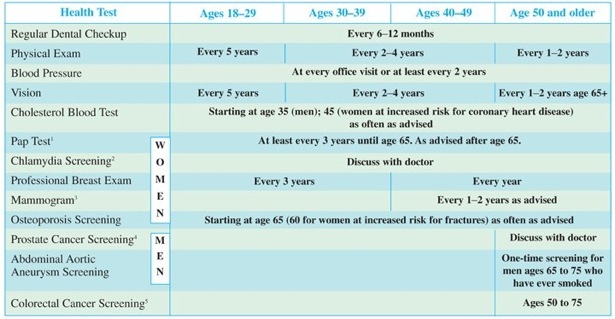-
Medical Exams & Tests


Note: These are general guidelines. Adults should also be screened for alcohol misuse, depression, obesity, and tobacco use. If you are at an increased risk for an illness, tests may need to be done sooner or more often. Extra tests (e.g., screening for diabetes, glaucoma) may also need to be done. Persons with high blood pressure or high cholesterol should be screened for diabetes. Follow your doctor’s advice. Check with your health plan to see if and when tests are covered. You can get updates and more information on tests and exams from the Agency for Healthcare Research and Quality’s “Guide to Clinical Preventive Services” at www.ahrq.gov/clinic/pocketgd.htm.
-
1.Pap tests should begin within 3 years of the onset of sexual activity or age 21 (whichever comes first).
-
2.All sexually active females aged 25 or younger and females older than age 25 who: Have more than one sexual partner; have a sex partner who has more than one partner; have had a sexually transmitted infection (STI) in the past; or who do not use condoms consistently and correctly, should have routine chlamydia screenings as often as advised by their doctors.
-
3.Women at a high risk for breast cancer should seek expert medical advice about getting mammograms before age 40 and how often to get them in their 40s.
-
4.African American men and men with a family history of prostate cancer should discuss screening for prostate cancer with their doctors starting at age 45.
-
5.Follow your doctor’s advice. Screening test options include a high-sensititivity stool blood test, sigmoidoscopy, and colonoscopy. How often testing is needed depends on the test(s) given.
Health Tests & When to Have Them






Copyright © 2009, American Institute for Preventive Medicine. All rights reserved.